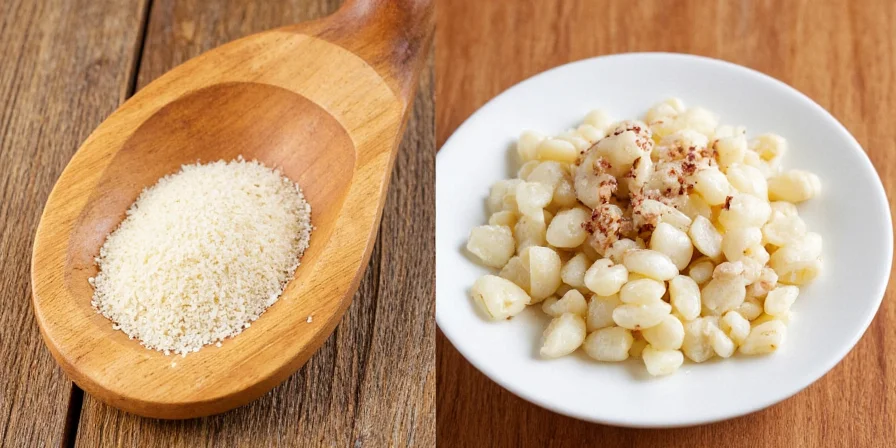Granulated Garlic vs Garlic Powder: Spice Wars – Which One Reigns Supreme in Your Kitchen?
Table of Contents
- Introduction: A Battle of the Bulbs
- What’s the Real Difference?
- Texture and Usage Face-Off
- Flavor Comparison: Bold or Subtle?
- Cooking Techniques: When to Use Which?
- Storage Tips: Keep It Fresh, Not Funky
- Recipe Recommendations for Each
- Pros and Cons Showdown
- Conclusion: Who Wins the Garlic Game?
Introduction: A Battle of the Bulbs
So you’ve decided to spice up your kitchen game—literally. But now you’re standing in front of the spice aisle staring at two bottles labeled "granulated garlic" and "garlic powder." Are they really different? Or is this just a marketing scam to confuse home cooks?

Well, fear not! This article will settle the debate once and for all, with a side of humor, a sprinkle of science, and a dash of cooking wisdom.
What’s the Real Difference?
Let’s start with the basics. Both granulated garlic and garlic powder are dehydrated forms of fresh garlic. But their differences lie in how they’re processed and how they perform in your cooking.
| Feature | Granulated Garlic | Garlic Powder |
|---|---|---|
| Making Process | Dried and coarsely ground | Dried and finely ground |
| Texture | Coarse sand-like texture | Silky, flour-like texture |
| Water Content | Nearly zero (dehydrated) | Nearly zero (dehydrated) |
| Shelf Life | 1-3 years | 2-4 years |
In short: granulated garlic is like the chunky cousin who likes to stand out, while garlic powder is the smooth operator that blends right in.

Texture and Usage Face-Off
- Granulated Garlic: Best when you want a subtle texture and more pronounced flavor. Ideal for rubs, marinades, and dishes where you want tiny bursts of garlic goodness.
- Garlic Powder: Perfect for when you want everything to blend seamlessly. Great for soups, sauces, and baked goods where a gritty texture isn’t welcome.

Think of it like choosing between gravel and powdered sugar for a dessert topping. Texture matters!
Flavor Comparison: Bold or Subtle?
Both types deliver that classic garlicky kick, but here's the twist:
- Granulated Garlic: Has a more intense and slightly fresher taste because the granules are larger and release oils more slowly during cooking.
- Garlic Powder: Slightly milder and mellower. Its fine texture means it disperses quickly and evenly, so you get a more uniform flavor throughout your dish.

Cooking Techniques: When to Use Which?
Now that we’ve covered the basics, let’s dive into real-world applications:
When to Use Granulated Garlic
- Barbecue Rubs: Adds great texture and flavor without turning into a paste.
- Pickling: Holds up well in brines and gives pickled veggies that zesty kick.
- Homemade Seasoning Blends: Keeps its structure and adds depth.
When to Use Garlic Powder
- Stews and Soups: Dissolves easily and distributes flavor evenly.
- Baked Goods: Think garlic bread or cheesy biscuits—you don’t want crunchy bits ruining the softness.
- Sauces and Dressings: Mixes in smoothly without leaving any gritty aftertaste.

Storage Tips: Keep It Fresh, Not Funky
Garlic seasonings may last a long time, but improper storage can turn them from fragrant to funky faster than you can say “aioli.”
- Store both in a cool, dry place away from direct sunlight.
- Airtight containers work best (glass jars with tight lids are ideal).
- Don’t store near onions or spices that have strong odors—yes, garlic can absorb smells!

Recipe Recommendations for Each
To help you make the most of these garlic gems, here are some delicious ideas:
Granulated Garlic Recipes
- BBQ Chicken Dry Rub: Combine with paprika, brown sugar, salt, and pepper for a smoky, garlicky crust.
- Spicy Pickled Carrots: Add a teaspoon to the brine for a garlicky tang that lingers on the tongue.
- Homemade Cajun Seasoning: Toss with thyme, oregano, cayenne, and black pepper for a bold, garlicky blend.
Garlic Powder Recipes
- Creamy Garlic Mashed Potatoes: Mix in during the mashing stage for silky, even garlic flavor.
- Tangy Garlic Ranch Dip: Blends perfectly into the dressing base for a creamy, garlicky dip.
- One-Pan Garlic Butter Shrimp: Stir into the butter sauce for a smooth, rich finish.

Pros and Cons Showdown
| Aspect | Granulated Garlic | Garlic Powder |
|---|---|---|
| Pros | More intense flavor, better texture in dry rubs | Smooth consistency, dissolves easily |
| Cons | May not dissolve completely in liquids | Less punchy, can be overpowering if overused |
| Best For | Dry applications, texture lovers | Wet dishes, seamless blending |

Conclusion: Who Wins the Garlic Game?
So, granulated garlic vs garlic powder—who takes the crown? The truth is, there’s no clear winner—it’s all about what you’re cooking and how you like your garlic to behave.
- If you're grilling, baking, or making a rub: go granulated.
- If you're blending into sauces, soups, or dressings: garlic powder is your ally.
And remember, having both in your pantry is like having Batman and Robin in your spice squad—they each do their thing, and together, they’re unstoppable.

Happy seasoning, fellow garlic fans—and may your breath always be worth the bite!











 浙公网安备
33010002000092号
浙公网安备
33010002000092号 浙B2-20120091-4
浙B2-20120091-4